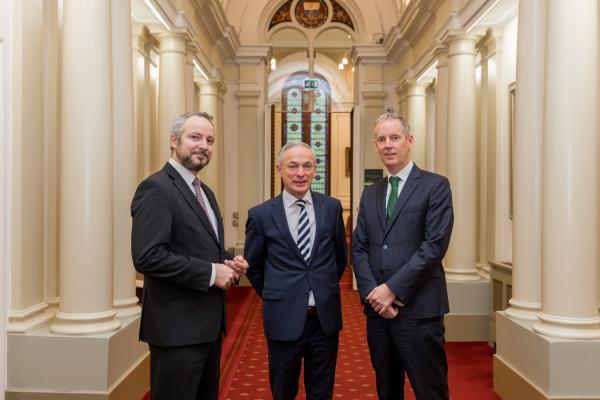
The EIB-European Investment Advisory Hub, in conjunction with the European Commission, the SBCI and the government funded Sustainable Energy Authority of Ireland (SEAI), today hosted an event in Dublin examining how energy efficiency is financed in Europe. The Minister for Communications, Climate Action and the Environment, Richard Bruton T.D. attended the event which highlighted the importance of providing low cost finance options for homeowners and businesses if ambitious targets for energy saving are to be met.
Speaking at the event, Minister Bruton said: “We need to change how we live now, if we are to secure a sustainable future for all. This is a profound challenge to every citizen, every enterprise, every public service and every community. The reality is that our current trajectory with regard to sustainable energy use is not where it needs to be. We are making progress but we need to do more and do it quickly. Lack of funds is one of the main reasons homeowners are not carrying out much needed energy upgrades, that is why low cost finance options for these upgrades are so important. Similarly SMEs and the public sector need innovative financing mechanisms to enable change to happen faster and keep pace with our ambitions. The work that the government through SEAI are progressing with the EIB, the Strategic Banking Corporation and local high street banks, is seeking to bridge the gap between portfolios with excellent return on investment and the type of large scale funding required to accelerate activity.”
There are currently about 2 million homes in Ireland accounting for 25% of energy related emissions. However, about half of these have a BER rating of D or less. Significant opportunities exist for business both in terms of savings and developing solutions. SEAI’s grant programmes are the main driver of activity among homes and businesses but many still feel the initial outlay is a barrier. If Ireland is to reach its targets then this must be overcome.
Jim Gannon, Chief Executive of SEAI said: “SEAI has supported over 400,000 homes with energy upgrades and many thousands of businesses have also carried out energy projects as a result of our advice and incentives. As we now look towards 2030, it is apparent that traditional incentives and exchequer funding will not, and should not, be expected to support all of this transition. Across almost all energy efficiency interventions, we see benefit across the value chain. Engaging private finance, of various types, is essential to moving us towards a more sustainable economy, at the pace that will meet our ambition.”
Opportunities exist across the country with a significant body of work in need of being carried out. This is good news for contractors but also makes financial sense for the state and for individual homeowners and businesses.
Addressing the role of the European Commission, its Vice-President for the Energy Union Maroš Šefčovič said: “To achieve the EU's 2030 climate and energy goals, around EUR 180 billion of additional investments per year are necessary. Around 75% of those investments need to be channelled to improve energy efficiency in buildings. This requires developing and deploying breakthrough innovation on a massive scale, while both, public and private sectors need to play their part. We are mobilising our instruments to support Energy Efficiency in the built sector: Strategic Investment Fund, European Regional Development Fund, Smart Financing for Smart Buildings etc. We are stepping up our game. That is why during 2021-2027, the Commission envisages a 25% climate mainstreaming, meaning that more than EUR 300 billion of our funding would contribute to climate objectives.”
Andrew McDowell, Vice President of EIB who made the opening address at the event, said: “Cutting energy use is crucial for tackling climate change and saves money. Last year the European Investment Bank provided EUR 4.8 billion for energy efficiency investment around the world and energy efficiency is a key focus of the European Investment Advisory Hub. Building on close cooperation between Irish and European partners in recent months, today’s practical discussions bring together more than 120 representatives of local government, utilities, housing bodies and business from across Ireland and energy efficiency experts with experience around Europe. We look forward to building on today’s overview of best practice and successful implementation of energy saving measures to scale up advisory and financing for energy efficiency in Ireland in the years ahead.”



